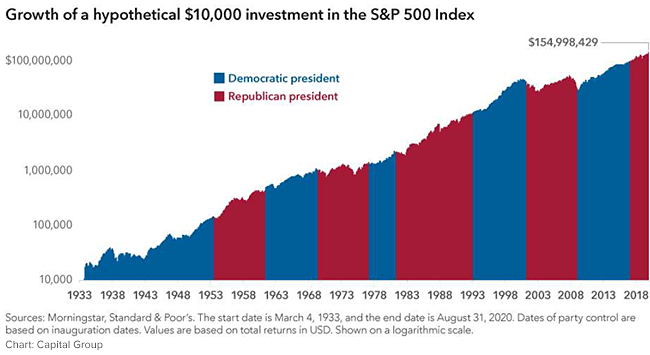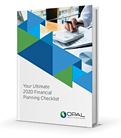How the Upcoming Election Could Impact Your Investment Portfolio
By Jesse Giordano, CFP® | September 30, 2020The stock market and the economy have both had a crazy year, thanks to an unprecedented global pandemic. Many investors have been understandably shaken—2020 has had no shortage of uncertainty and confusion. But for the most part, the markets have been going strong. For the third quarter, the Nasdaq was up almost 65% from its late March low point. Similarly, both the Dow and the S&P 500 bounced up roughly 50%.

All eyes are now on the upcoming election. No matter which candidate wins, many investors are feeling skittish about what either outcome could mean for their portfolios. The election is adding even more uncertainty to an already tumultuous year, and investors are concerned about how to move forward. If you’re curious about how your investments will fare under a Trump or Biden administration, history may be your best source of guidance.
How Past Presidential Elections Have Affected Markets
The future may be filled with question marks, but the past is set in stone. Despite all the headlines of stock market doom and gloom if one candidate wins over another, history has shown us again and again that elections have never had a lasting impact on market activity. In fact, they’ve had virtually no effect on long-term returns.

As the chart above illustrates, the market has come out resilient after controversial elections of years past. It has continued to track upward over the past 85 years, regardless of the prevailing party.
It isn’t uncommon, however, to see short-term election volatility, but it tends to fizzle out and lead to rising markets once the dust settles. If past elections are any indication of the future, we’re likely to see strong long-term equity returns no matter who claims the White House.
What a Second Trump Term Could Mean for Your Portfolio
If there’s one thing we know for sure it’s that markets generally do not like uncertainty. In this way, if the election results in more of the same—President Trump in office with a split Congress—short-term market volatility will be less likely. Whoever wins, it all comes down to the president’s ability to enact legislation. Even if Joe Biden prevails, if Congress remains split between Democrats and Republicans, it’s unlikely that any big, sweeping legislation will be passed. Believe it or not, this kind of gridlock is good for markets because it eliminates a lot of unknowns.
How a Blue Wave Could Affect Your Investments
Things may be more volatile in the short term if Biden wins and there’s also a blue wave where Democrats take control of the House and the Senate. Wall Street surveys have revealed uncertainty around Biden’s tax plan, which would potentially roll back Trump’s corporate tax cuts. This in itself could trigger a temporary market sell-off.
But it’s worth noting that an additional economic stimulus and calmer seas with the China trade war could potentially even things out. A robust COVID-19 response plan could also quell markets, especially if it’s paired with initiatives aimed at infrastructure and renewable energy.
A Contested Election Could Shake Up Markets
We should mention one other scenario that could potentially unsettle the markets—a contested election. It’s a situation that’s inherently uncertain. During the contested Bush-Gore 2000 election, the S&P 500 declined by about 6%. The Dow reacted in kind, tumbling by about 5%. However, research shows that even this kind of volatility tends to be short-lived. This is why we encourage investors to back up and look at the bigger picture.
How to Proceed with Your Investment Portfolio
In the end, none of us can really predict how the stock market will respond to any given election—no matter which way it goes. What we do know is that the markets typically respond negatively to uncertainty of any kind, especially where policy direction is concerned. The upside is that it tends to pass soon enough.
One unique thing about this moment is that it looks as though much of the uncertainty of the upcoming election is already baked into the market. It brings an old Warren Buffet adage to mind, “Be fearful when others are greedy, and greedy when others are fearful.” Following that wisdom, investors who have a 12- to 18-month time horizon may be rewarded by taking advantage of opportunities now and in the coming months.
Those who are able to ignore all the noise and stick with their long-term investment plans are poised to reap the greatest returns in the long run. It’s never a bad idea to reach out to your financial advisor to see if rebalancing your portfolio makes sense during this time. Doing so can keep you actively invested while mitigating risk during an election cycle. Opal Wealth Advisors is happy to connect with investors via virtual appointments.
Be a Smart Investor
Stay up-to-date with industry-leading information and news delivered straight to your inbox.
Get our timely insights delivered to your inbox (Blog)
Please remember that past performance may not be indicative of future results. Different types of investments involve varying degrees of risk, and there can be no assurance that the future performance of any specific investment, investment strategy, or product (including the investments and/or investment strategies recommended or undertaken by Opal Wealth Advisors, LLC [“OWA]), or any non-investment related content, made reference to directly or indirectly in this commentary will be profitable, equal any corresponding indicated historical performance level(s), be suitable for your portfolio or individual situation, or prove successful. Due to various factors, including changing market conditions and/or applicable laws, the content may no longer be reflective of current opinions or positions. Moreover, you should not assume that any discussion or information contained in this commentary serves as the receipt of, or as a substitute for, personalized investment advice from OWA. OWA is neither a law firm, nor a certified public accounting firm, and no portion of the commentary content should be construed as legal or accounting advice. A copy of the OWA’s current written disclosure Brochure discussing our advisory services and fees continues to remain available upon request or at www.opalwealthadvisors.com. Please Remember: If you are a OWA client, please contact OWA, in writing, if there are any changes in your personal/financial situation or investment objectives for the purpose of reviewing/evaluating/revising our previous recommendations and/or services, or if you would like to impose, add, or to modify any reasonable restrictions to our investment advisory services. Unless, and until, you notify us, in writing, to the contrary, we shall continue to provide services as we do currently. Please Also Remember to advise us if you have not been receiving account statements (at least quarterly) from the account custodian.



